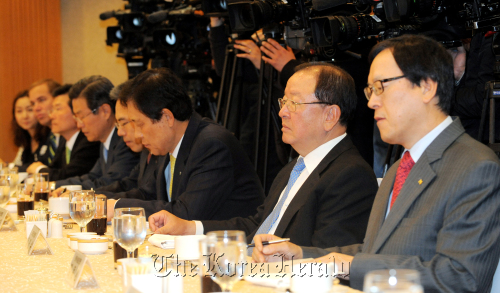At regulator’s demand, commercial lenders to take over 400b won in bad debts from troubled savings banks
Several commercial banks on Tuesday accepted the financial authorities’ proposal to absorb a large portion of the soured loans held by distressed savings banks.
The situation is provoking debate over whether financial regulators have been intervening in the market legitimately.
A meeting between Financial Supervisory Service Gov. Kwon Hyouk-se and CEOs of 13 banks was arranged while the secondary banking sector saw their construction-related financing loans ― known as PF loans ― set an all-time high.
“Several banks said they would acquire as much as 400 billion ($360 million) won (in toxic PF loans),” Kwon told reporters after their meeting at the Bankers’ Club in Seoul.
Several commercial banks on Tuesday accepted the financial authorities’ proposal to absorb a large portion of the soured loans held by distressed savings banks.
The situation is provoking debate over whether financial regulators have been intervening in the market legitimately.
A meeting between Financial Supervisory Service Gov. Kwon Hyouk-se and CEOs of 13 banks was arranged while the secondary banking sector saw their construction-related financing loans ― known as PF loans ― set an all-time high.
“Several banks said they would acquire as much as 400 billion ($360 million) won (in toxic PF loans),” Kwon told reporters after their meeting at the Bankers’ Club in Seoul.

Each bank that accepted the proposal is expected to take on soured PF loans from at least 30 billion won up to 100 billion won, respectively. To maximize the efficiency, the banks are expected to set up a bad bank.
Meanwhile, it has been speculated that some CEOs took a wait-and-see attitude or expressed skepticism toward the chief regulator’s request.
A local banker said the FSS and the Financial Services Commission have a tendency of twisting arms of banks. “The regulators’ action to bailout ailing companies is very prompt. But they have little progress on bigger issues including probing Lone Star Funds.”
Critics stressed that regulators should initially apologize for their failure in supervising savings banks.
Though Kwon said several banks promised to support the secondary banking sector in their “voluntary” move, the financial authorities have continued to request it over the past several weeks.
Some FSS officials argue there is no choice but to induce banks’ participation to deal with the insolvent loans, reiterating the necessity of intervention.
According to data of the Bank of Korea, secondary financial companies’ loans to the real estate sector totaled 23.3 trillion won during the fourth quarter.
The figure was equivalent to 14.2 percent of their total lending to overall industries, which posted the highest level since the central bank began calculating the ratio in the first quarter of 2008.
Their loans to the construction sector also continued to increase over the past few years, amounting to 17 trillion won.
The loans to real estate and construction are closely related to the liquidity crises many banks are facing because of overdue PF loans.
FSS data also shows that savings banks are suffering most from bad property loans with their average default rate reaching 25 percent at the end of 2010, far higher than the 12.9 percent average for the entire financial industry.
A prolonged slump in the real estate market since the global financial crisis has crippled builders’ ability to repay loans extended during a previous market boom to finance their construction projects.
Regulators halted operations of eight major savings banks during the first quarter of the year.
Apart from savings banks, five major commercial banks are also holding overdue PF loans ― which have been in arrears for more than three months ― worth about 3.3 trillion won, according to FSS data.
Further, total PF loans including the soured lending held by the five banks ― Kookmin, Woori, Shinhan, Hana and Korea Exchange ― reached 23 trillion won as of March.
By Kim Yon-se (kys@heraldcorp.com)


















![[Today’s K-pop] Treasure to publish magazine for debut anniversary](http://res.heraldm.com/phpwas/restmb_idxmake.php?idx=642&simg=/content/image/2024/07/26/20240726050551_0.jpg&u=)